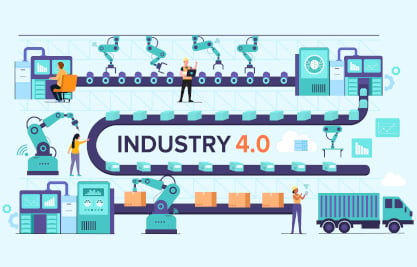With all the recent advancements and new tech, industry 4.0 is transforming the supply chain. Leveraging all of its advantages, it continues to revolutionize manufacturing processes! As a result, businesses are experiencing unprecedented changes in managing and optimizing their supply chains.
Understanding industry 4.0
 Understanding Industry 4.0 is the basis of gleaning how it transforms the supply chain. This revolution integrates advanced technologies like IoT, AI, and automation into production. Through real-time data analysis, smart factories optimize operations efficiently. These innovations streamline processes, enhancing productivity and reducing costs.
Understanding Industry 4.0 is the basis of gleaning how it transforms the supply chain. This revolution integrates advanced technologies like IoT, AI, and automation into production. Through real-time data analysis, smart factories optimize operations efficiently. These innovations streamline processes, enhancing productivity and reducing costs.
In addition, Industry 4.0 fosters machine connectivity, enabling seamless communication and coordination. As a result, companies gain insights into their operations, allowing for better decision-making! Naturally, these positive effects impact how Industry 4.0 transforms the supply chain.
Smart factories as the backbone of Industry 4.0
Smart factories are the backbone of Industry 4.0, revolutionizing manufacturing processes worldwide. These advanced facilities leverage cutting-edge technologies like IoT and AI to improve manufacturing efficiency and quality control. Smart factories optimize operations by integrating real-time data analytics, leading to enhanced productivity and reduced downtime.
Also, the predictive maintenance capabilities of these facilities help prevent equipment failures, ensuring smooth operations. Through automation and robotics, once labor-intensive tasks are now streamlined, minimizing errors and increasing output consistency. Additionally, smart factories prioritize quality control, employing sensors and AI algorithms to detect defects early in the production cycle.
Connectivity and IoTin manufacturing
IoT and connectivity are becoming increasingly helpful for streamlining operations and enhancing efficiency. IoT devices, such as sensors and actuators, enable seamless communication between machinery, allowing for real-time monitoring and data collection. This connectivity empowers manufacturers to gain valuable insights into their production processes, leading to informed decision-making and proactive maintenance strategies.
With IoT, equipment performance can be monitored remotely, enabling timely interventions to prevent breakdowns and minimize downtime. At the same time, IoT-driven predictive analytics enable manufacturers to optimize resource utilization and improve overall productivity!
AI and machine learning in supply chain management
AI and machine learning are indispensable tools for overcoming procurement challenges. By harnessing the power of AI algorithms, businesses can optimize their procurement processes, from supplier selection to contract negotiation. Machine learning algorithms analyze vast amounts of data to identify patterns and trends, enabling more accurate demand forecasting and inventory management.
indispensable tools for overcoming procurement challenges. By harnessing the power of AI algorithms, businesses can optimize their procurement processes, from supplier selection to contract negotiation. Machine learning algorithms analyze vast amounts of data to identify patterns and trends, enabling more accurate demand forecasting and inventory management.
This predictive capability helps businesses anticipate fluctuations in demand and adjust their procurement strategies accordingly, minimizing the risk of stockouts or overstocking. In addition, AI-powered analytics provide valuable insights into supplier performance, allowing businesses to make data-driven decisions and build stronger supplier relationships!
Robotics and automation revolutionizing production
Robotics and automation are among the main contributors spearheading a revolution in production processes. These technologies streamline operations by performing repetitive tasks with precision and efficiency. By automating manual processes, companies can significantly increase production output while reducing labor costs.
Also, robotics enhance workplace safety by handling hazardous tasks and minimizing human exposure to risk. With advancements in collaborative robotics, or cobots, human workers can collaborate seamlessly with machines, further boosting productivity! Automation also enables flexibility in production, allowing for rapid reconfiguration of production lines to meet changing demands. As a result, businesses can respond swiftly to market fluctuations and customer preferences.
3d printing is a massive improvement in manufacturing
3D printing is undeniably a major shift in manufacturing, improving traditional production methods with its versatility and efficiency. This innovative technology enables the creation of complex geometries and intricate designs with unmatched precision. Unlike conventional manufacturing processes, 3D printing reduces material wastage and allows for on-demand production, eliminating the need for large inventories and costly tooling.
Likewise, the rapid prototyping capabilities of 3D printing enable companies to accelerate product development cycles and bring new ideas to market faster. From aerospace components to medical implants, the applications of 3D printing are virtually limitless, offering solutions to diverse industry challenges!
Supply chain visibility and transparency
 Supply chain visibility and transparency are important aspects of modern business operations, enabling companies to track the movement of goods from suppliers to customers. By leveraging technologies like blockchain, businesses can achieve greater transparency across their supply chains, ensuring accountability and trust.
Supply chain visibility and transparency are important aspects of modern business operations, enabling companies to track the movement of goods from suppliers to customers. By leveraging technologies like blockchain, businesses can achieve greater transparency across their supply chains, ensuring accountability and trust.
With real-time visibility into inventory levels, shipping status, and production schedules, companies can make better decisions and respond swiftly to demand changes or supply chain disruptions. Besides, enhanced transparency allows for better risk management and compliance with regulatory requirements, reducing the likelihood of costly penalties or reputational damage!
Resilience and agility in supply chain management
Resilience and agility are important for successful supply chain management, especially in today's volatile business environment. Companies prioritizing these qualities can adapt quickly to unforeseen disruptions and maintain operational continuity. They can even enhance their supply chain's overall speed and efficiency, too!
That applies even to industries like the moving industry, where speed and reliability are of utmost importance. For example, people who work with Relosmart Movers Hong Kong can count on their relocations being completed in a tidy and efficient manner according to the exact schedules drafted, not just in their main seat in Hong Kong or even the entirety of China but globally! So, they can offer customized and SMART relocation solutions to everyone who needs their services worldwide. That demonstrates how resilience and agility can guarantee the quality of their services in the global marketplace.
Sustainability and Ethical Manufacturing Practices
Sustainability and ethical manufacturing practices are gaining traction as consumers become more environmentally conscious. Companies increasingly embrace these principles to minimize their environmental footprint and uphold ethical standards throughout their supply chains. By adopting sustainable manufacturing processes and sourcing materials responsibly, businesses can reduce waste and energy consumption while mitigating the impact on the planet. For instance, companies like Patagonia and Eileen Fisher have integrated sustainability into their business models, demonstrating a commitment to ethical production and environmental stewardship.
The necessary skill for leveraging how Industry 4.0 is transforming the supply chain
Workforce development and  upskilling play a significant role in driving supply chain improvements. Consequently, as technology advances and supply chains become more complex, companies must invest in training and development programs to equip their employees with the skills needed to thrive in the digital age. Businesses can enhance their workforce's capabilities and adaptability by providing opportunities for upskilling in areas such as data analytics, AI, and automation. Likewise, investing in employee development fosters loyalty and engagement, leading to higher job satisfaction and retention rates!
upskilling play a significant role in driving supply chain improvements. Consequently, as technology advances and supply chains become more complex, companies must invest in training and development programs to equip their employees with the skills needed to thrive in the digital age. Businesses can enhance their workforce's capabilities and adaptability by providing opportunities for upskilling in areas such as data analytics, AI, and automation. Likewise, investing in employee development fosters loyalty and engagement, leading to higher job satisfaction and retention rates!
Leaders in the modern manufacturing industry
With all we covered on how Industry 4.0 is transforming the supply chain, it’s obvious that keeping up will be necessary for every business that doesn’t want to get left behind. Embracing technological advancements like IoT, AI, and automation lets businesses thrive amidst all the new developments! Consequently, companies can only unlock unprecedented efficiency, resilience, and sustainability by leveraging these innovations, positioning themselves as leaders in the modern manufacturing industry.







